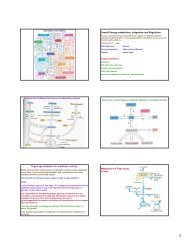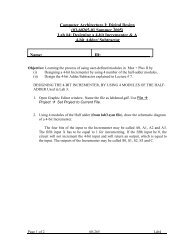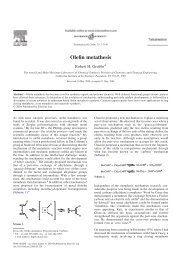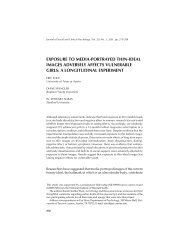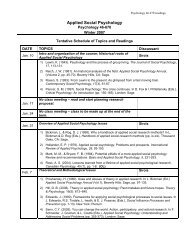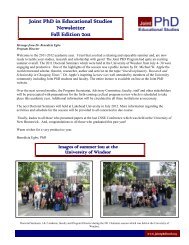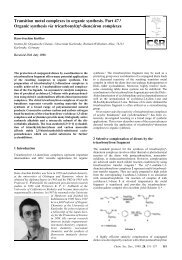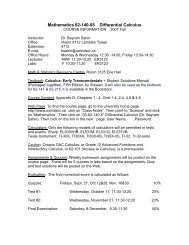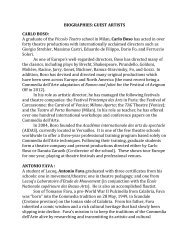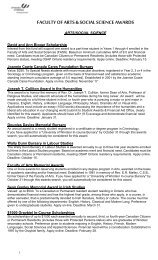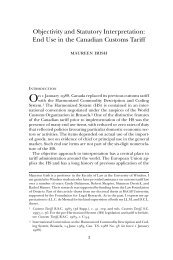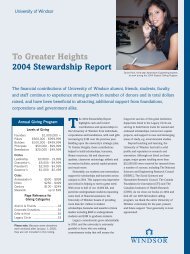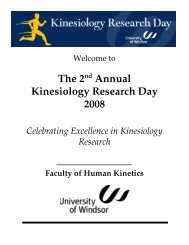Critical Social Work - University of Windsor
Critical Social Work - University of Windsor
Critical Social Work - University of Windsor
Create successful ePaper yourself
Turn your PDF publications into a flip-book with our unique Google optimized e-Paper software.
Brown<br />
discourse needs to challenge the limitations <strong>of</strong> essentialism and subjectivism.<br />
The Master’s Tools: Reification <strong>of</strong> Dominant Discourse <strong>of</strong> Difference<br />
Within a critical reflexive epistemology, a third limitation <strong>of</strong> modernist conceptual<br />
practices <strong>of</strong> power I focus on here, is its inadvertent reification <strong>of</strong> dominant and oppressive<br />
discourse. This is a critical focal point for reflexivity as discursive practices <strong>of</strong> power can<br />
unobtrusively and invisibly work against the emancipatory agenda <strong>of</strong> anti-oppression discourse.<br />
Specifically, I examine pre-constituted binary or oppositional constructions <strong>of</strong> differences as<br />
conceptual practices <strong>of</strong> power which reifies dominant discourse and social relations <strong>of</strong> power.<br />
The modernist foundation <strong>of</strong> anti-oppression discourse centers on a number <strong>of</strong> key concepts,<br />
including difference which is most <strong>of</strong>ten articulated in terms <strong>of</strong> gender, race, and class. Since the<br />
late 1980’s, differences between social groups are emphasized with the conversation shifting to<br />
social location and identity. Following debates within feminist postmodernism some have argued<br />
that the pendulum has swung from a focus on sameness or what we have in common in order to<br />
mobilize for change within social justice based anti-oppressive agenda’s to one on difference and<br />
plurality (Brown, 1994). <strong>Social</strong>ly constructed differences are too <strong>of</strong>ten simply reified, and the<br />
approach becomes one which re-inscribes existing differences rather than challenging social<br />
categories as social, historical, and political constructions. Now people are constructed in terms<br />
<strong>of</strong> difference rather than sameness. We have simply invoked the flip side <strong>of</strong> the binary, losing it<br />
seems the possibility that people are likely to be both the same, and different,<br />
both within social groups and between them.<br />
We are likely to produce as many problems with the focus exclusively on difference as<br />
we did with a focus exclusively on sameness. While the focus is on difference, sameness and<br />
unity are emphasized within social groups, as are a shared reality, experience and oppression.<br />
Binary oppositions are reinforced by focusing on shared interests and experience within specific<br />
social locations such as gender, race, and class. Aside from the fractiousness, and immobilizing<br />
<strong>of</strong> possible social action, which others have identified as a limitation, the totalizing focus on<br />
difference is objectifying, and othering. People are positioned as insiders and outsiders, and those<br />
most marginalized are reified in these positions as others. To always be positioned outside the<br />
center is to stay at the margins. Rather than challenging the center, it freeze frames the<br />
preconstituted categories <strong>of</strong> the haves and the have nots as though it could never be any other<br />
way. At the same time, the current focus on intersectionality is at least in part a response to this<br />
critique and has the potential to challenge these binaries as well as totalization <strong>of</strong> social<br />
categories as more complex thinking about identity continues to emerge.<br />
Beyond dominant binary constructions <strong>of</strong> social location and identity within modernist<br />
anti-oppressive discourse are oppositional conceptual practices such as mind/body,<br />
reason/emotion, individual/social, subjective/objective, expert/non-expert, powerful/powerless,<br />
content/process, oppressor/oppressed, powerful/powerless, expert/not-knowing and<br />
theory/practice. All <strong>of</strong> these dualisms are conceptual practices <strong>of</strong> power which can be taken apart<br />
to reveal tremendous conservatizing limitations (Brown, 1994, 2007b).<br />
When dominant discourse bound to dichotomy is deconstructed, the both/and complexity<br />
<strong>of</strong> differences and similarities becomes visible. However, when essentializing and reinscribing<br />
<strong>Critical</strong> <strong>Social</strong> <strong>Work</strong>, 2012 Vol. 13, No. 1<br />
47




